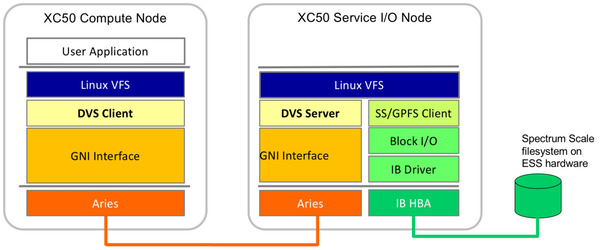I/O Performance Considerations
It is important to understand the different I/O performance characteristics of nodes that connect to storage using native Spectrum Scale clients, and those that employ Cray’s DVS solution.
Applications that make heavy demands on metadata services and or have high levels of small I/O activity should generally not be run on Māui (the Cray XC50).
Nodes which access storage via native Spectrum Scale Clients¶
All Mauhika HPC Cluster, Mahuika Ancillary, Māui Ancillary and Māui login (aka build) nodes have native Spectrum Scale clients installed and provide high performance access to storage:
- Metadata operations of the order of 190,000 file creates /second to a unique directory can be expected;
- For 8MB transfer size, single stream I/O is ~3.3GB/s Write and ~5GB/s Read;
- For 4KB transfer size, single stream I/O is ~1.3GB/s Write and ~2GB/s Read.
Nodes which access storage via DVS¶
Māui (XC50) utilizes a file system projection method via software, known as DVS (Data Virtualisation Service), to expose the Spectrum Scale file systems to XC compute nodes. DVS adds an additional layer of hardware and software between the XC compute nodes and storage (see Figure).

Figure 1: Cray XC50 DVS architecture.
This reduces the I/O performance of Māui for metadata and small (e.g. 4KB) I/O operations. It does not impact the total bandwidth available from the Māui (i.e. ~130 GB/s when writing to the filesystem). Accordingly, the equivalent performance numbers for DVS connected compute nodes are:
- Metadata operations of the order of 36,000 file creates /second to a unique directory can be expected, i.e. approximately 23% of that achievable on a node that has a Spectrum Scale client.
- For 8MB transfer size, single stream I/O, is ~3.2GB/s for Write and ~3.2 GB/s for Read;
- For 4KB transfer size, single stream I/O, is ~2.3GB/s for Write and ~2.5GB/s for Read (when using IOBUF see Caution below). When IOBUF is not used Read and Write performance is <1GB/s.
Unless Cray’s IOBUF capability is suitable for an application, users should avoid the use of single-stream I/O with small buffers on Māui.
IOBUF¶
Cray’s IOBUF ( man iobuf ) is an
I/O buffering library that can reduce the I/O wait time for programs
that read or write large (or small) files sequentially. IOBUF intercepts
standard I/O calls such as read and open and replaces the
stdio (
glibc, libio ) layer of buffering
with an additional layer of buffering, thus improving program
performance by enabling asynchronous prefetching and caching of file
data.
Danger
IOBUF is not suitable for all I/O styles. IOBUF does not maintain coherent buffering between processes which open the same file. For this reason, do not use IOBUF with shared file I/O, such as MPI-IO routines like MPI_File_write_all . IOBUF is not thread-safe, so do not use it with multithreaded programs in which the threads perform buffered I/O. IOBUF can be linked into programs that use these I/O styles, but buffering should not be enabled on those files.
Data compression¶
The file system the NeSI platforms use allow for transparent compression of data, meaning you can reduce the storage footprint of your data without needing to add any extra steps in your workflow unless you want to decompress the data after use. However, testing has shown that there can be an impact on job performance due to I/O. You can find out more about tests and results regarding performance of transparent data compression on the NeSI platforms on our Data Compression support page.